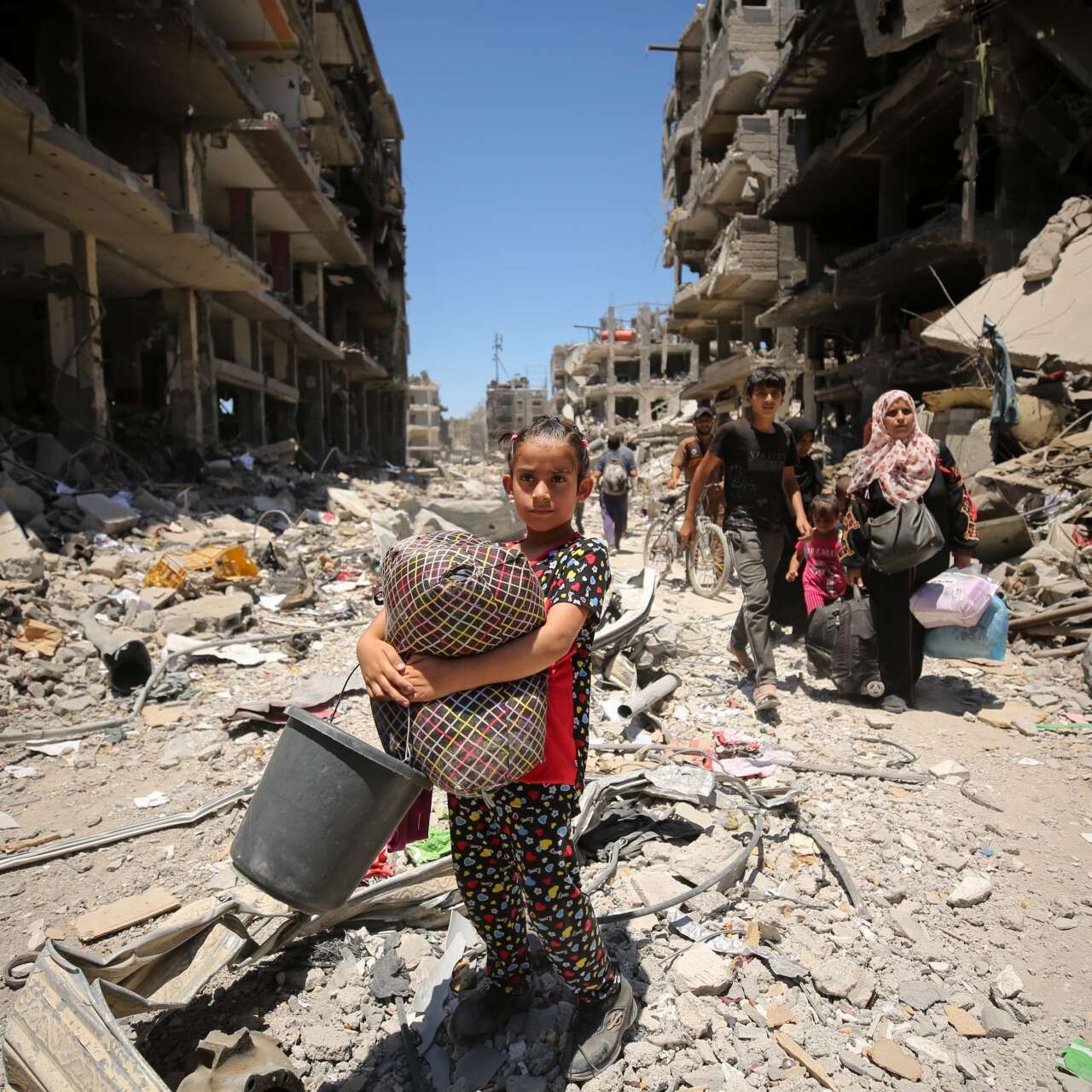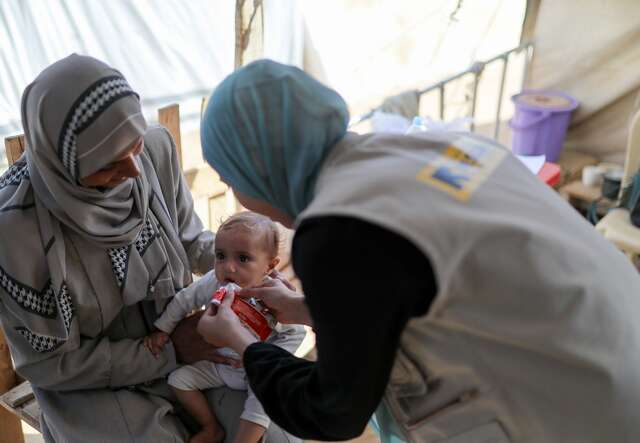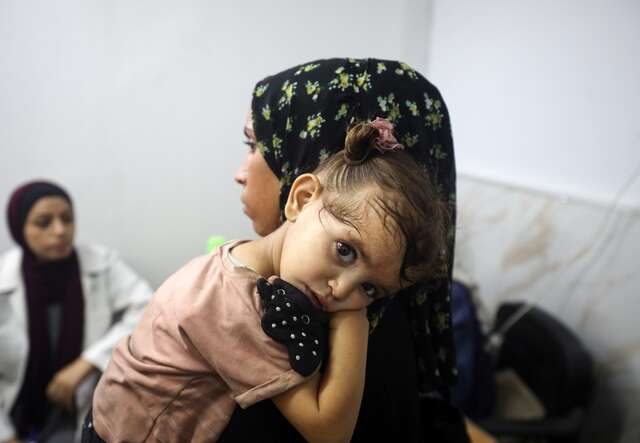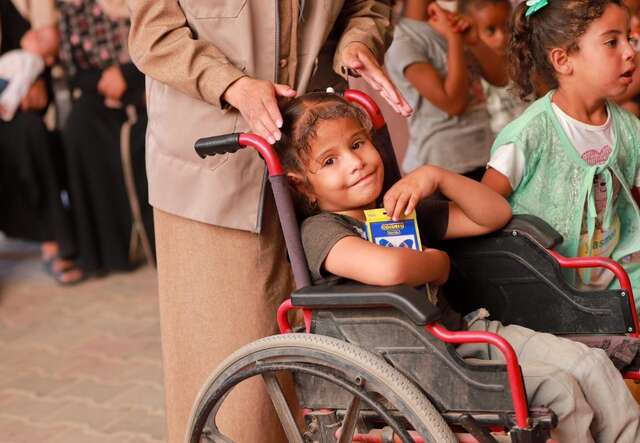
How is war affecting children in Gaza?
Palestinian children are bearing the brunt of the war in Gaza. We must help.

Palestinian children are bearing the brunt of the war in Gaza. We must help.
EDITOR’S NOTE: This article was last updated on September 24, 2025. Please refer to our explainer article for the latest updates on the crisis in Gaza.
Children in Gaza are living through one of the world’s most urgent humanitarian crises. For nearly two years, they have faced bombardment, hunger and displacement as they bear the brunt of the war in Gaza. Thousands of children have been killed, and many more are living with life-changing injuries and severe mental trauma.
More than 64,000 Palestinians have been killed since war erupted on October 7, 2023, according to the U.N. Office for the Coordination of Humanitarian Affairs (OCHA), which bases its figures on Gaza Health Ministry statistics. Nearly half of the identified fatalities are women and children.
The children of Gaza urgently need a ceasefire and a massive increase in humanitarian aid. Current restrictions on food, water and medical supplies are costing lives every day.
The International Rescue Committee (IRC) is on the ground in Gaza, delivering critical support to Palestinian children and their families.
Children have not been spared in the war in Gaza. The conflict has killed thousands and violence against children remains tragically common, with the IRC reporting a 48% increase in child protection cases in September 2025. Shrapnel injuries—and the amputations they have caused—have altered the lives of thousands of children in Gaza, which already held the grim distinction of having the highest number of child amputees per capita worldwide.
Children are also dying from starvation and disease. At the same time, education, usually a source of safety and healing, has been out of reach for nearly two years.
Hunger levels have reached alarming heights, with famine conditions being met in parts of Gaza. In July alone, more than 60 children lost their lives to hunger-related causes—deaths that could have been prevented with access to adequate food and medical care.
The Government of Israel’s blockade of aid has created a crisis: Bakeries are shuttered, food prices have skyrocketed 700% and nearly a third of Gaza’s population goes entire days without eating. With just 1% of households in Gaza considered food secure, families are skipping meals, reducing portions, and making impossible choices to survive
Rania Al Shrehi, an IRC staff member in Gaza, recounts: “The sound of children crying from hunger never stops. Every day, people knock on our doors asking for food. Not money—just bread.”
The IRC is screening children for signs of malnutrition and providing lifesaving treatment. But with humanitarian aid barely being allowed to enter Gaza and ongoing hostilities putting IRC staff at risk, nutrition programming has been heavily disrupted. Supplies of therapeutic food are running low and reaching those already under treatment is becoming harder by the day.

Even before the current escalation, more than one million Palestinian children needed mental health and psychosocial support. Today, every child in Gaza has been exposed to deeply distressing events—losing loved ones, witnessing violence and enduring constant fear.
At least 17,000 children are now unaccompanied or separated from their parents. These children face heightened risks of child labor, exploitation, neglect, starvation and lasting mental trauma.
“These are children who have lost limbs, who wake up screaming from nightmares, who no longer feel safe even in their own families,” explains Zoe Daniels, IRC’s Country Director for the occupied Palestinian territory.
“Our teams are doing everything possible to support them, but without safe access and basic supplies, their recovery is at risk of stalling completely.”
The IRC’s protection programs prioritize the safety and well-being of women and children by providing case management, counseling and group activities designed to help children and caregivers cope with the crisis in Gaza.

All children have the fundamental right to education. In Gaza, that right has almost completely vanished. At least 658,000 school-age children have lost access to all formal learning activities as most schools are being used as shelters. In addition, nearly 90% of schools have been damaged and will require major repairs or full reconstruction before they can reopen.
For Palestinian children, education is a lifeline. It reduces the risk of child labor, trafficking, and early marriage—harms that disproportionately impact girls and undermine children’s protection and well-being.
The IRC is delivering early childhood development programs in Gaza, reaching over 22,000 children with structured activities in shelters, mobile kindergartens and community spaces. These programs help children learn, play and regain a sense of normalcy as they continue to endure the unimaginable crisis in Gaza.
Your donation can help restore the fundamental right to education for Gaza’s children.

Children in Gaza need safety, protection and immediate humanitarian aid. A ceasefire is the best way to fully protect Palestinian lives, secure the release of hostages, and safely scale up humanitarian assistance and service delivery. All parties must take the steps to uphold international law and protect children.
Despite severe restrictions on aid delivery, the IRC reaches Palestinians in Gaza with life-saving services every day. We have supported more than 430,000 people since the outbreak of conflict and aim to reach 150,000 more by the end of 2025.
We are supporting Palestinian children in Gaza through:
The children of Gaza also deserve an immediate and lasting ceasefire, and a vast increase in humanitarian aid. Donors play a critical role in funding the support these children so desperately need.
Despite restrictions on aid delivery, the IRC continues to reach Palestinians with lifesaving health care, cash and emergency support. With operations in more than 40 countries around the world, your donation to the IRC will deliver critical aid where it's needed most.
The International Rescue Committee (IRC) helps people affected by humanitarian crises to survive, recover and rebuild their lives. We deliver lasting impact by providing health care, helping children learn, and empowering individuals and communities to become self-reliant, always with a focus on the unique needs of women and girls. Our work spans more than 40 crisis-affected countries, and we provide resettlement, asylum, and integration services in communities across the United States and Europe, including supporting refugees rebuilding their lives in the UK.